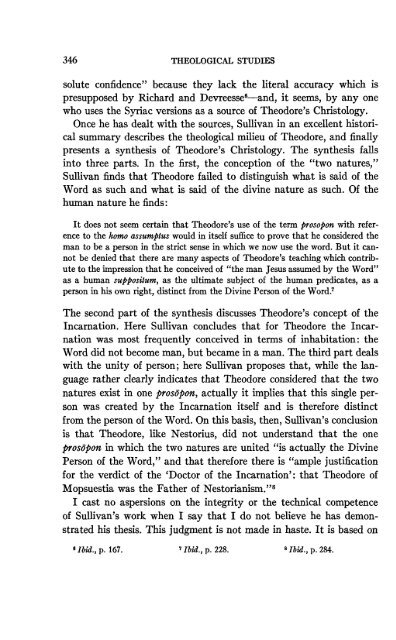ANNOTATIONS ON THE CHRISTOLOGY OF THEODORE OF ...
ANNOTATIONS ON THE CHRISTOLOGY OF THEODORE OF ...
ANNOTATIONS ON THE CHRISTOLOGY OF THEODORE OF ...
Create successful ePaper yourself
Turn your PDF publications into a flip-book with our unique Google optimized e-Paper software.
346 <strong>THE</strong>OLOGICAL STUDIES<br />
solute confidence" because they lack the literal accuracy which is<br />
presupposed by Richard and Devreesse 6 —and, it seems, by any one<br />
who uses the Syriac versions as a source of Theodore's Christology.<br />
Once he has dealt with the sources, Sullivan in an excellent historical<br />
summary describes the theological milieu of Theodore, and finally<br />
presents a synthesis of Theodore's Christology. The synthesis falls<br />
into three parts. In the first, the conception of the "two natures,"<br />
Sullivan finds that Theodore failed to distinguish what is said of the<br />
Word as such and what is said of the divine nature as such. Of the<br />
human nature he finds:<br />
It does not seem certain that Theodore's use of the term prosopon with reference<br />
to the homo assumptus would in itself suffice to prove that he considered the<br />
man to be a person in the strict sense in which we now use the word. But it cannot<br />
be denied that there are many aspects of Theodore's teaching which contribute<br />
to the impression that he conceived of "the man Jesus assumed by the Word"<br />
as a human supposition, as the ultimate subject of the human predicates, as a<br />
person in his own right, distinct from the Divine Person of the Word. 7<br />
The second part of the synthesis discusses Theodore's concept of the<br />
Incarnation. Here Sullivan concludes that for Theodore the Incarnation<br />
was most frequently conceived in terms of inhabitation: the<br />
Word did not become man, but became in a man. The third part deals<br />
with the unity of person; here Sullivan proposes that, while the language<br />
rather clearly indicates that Theodore considered that the two<br />
natures exist in one prosopon, actually it implies that this single person<br />
was created by the Incarnation itself and is therefore distinct<br />
from the person of the Word. On this basis, then, Sullivan's conclusion<br />
is that Theodore, like Nestorius, did not understand that the one<br />
prosopon in which the two natures are united "is actually the Divine<br />
Person of the Word," and that therefore there is "ample justification<br />
for the verdict of the 'Doctor of the Incarnation': that Theodore of<br />
Mopsuestia was the Father of Nestorianism." 8<br />
I cast no aspersions on the integrity or the technical competence<br />
of Sullivan's work when I say that I do not believe he has demonstrated<br />
his thesis. This judgment is not made in haste. It is based on<br />
6 Ibid., p. 167.<br />
7 Ibid., p. 228.<br />
8 Ibid., p. 284.
















